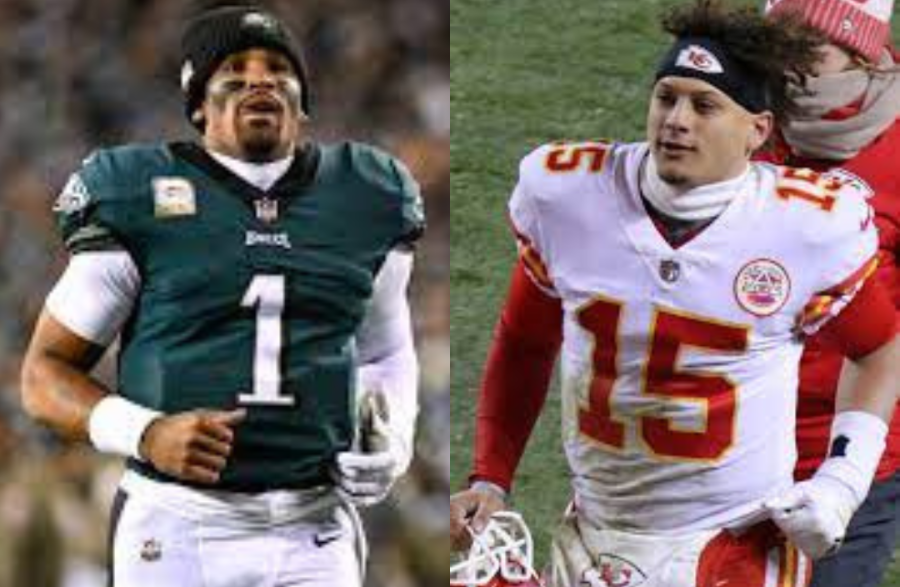Hurts and Mahomes face off in first Black quarterback matchup in history
This year’s Super Bowl features two Black quarterbacks going head-to-head for the first time
Hurts and Mahomes will face off this Sunday
February 6, 2023
This Sunday, February 12, Jalen Hurts of the Philadelphia Eagles and Patrick Mahomes of the Kansas City Chiefs will be the first two Black quarterbacks to face off against each other in any Super Bowl in history.
In Super Bowl LVII, Hurts has the chance to become the fourth Black quarterback in history to win a Super Bowl—or for Mahomes, he has the chance to win a second.
35 years ago, Doug Williams became the first Black quarterback to start in the Super Bowl—and remained the only one for the remainder of the 20th century until Steve McNair in 2000. Since McNair, only five other Black quarterbacks have started in the Super Bowl: Donovan McNabb, Colin Kaepernick, Russell Wilson, Cam Newton and Mahomes.
Now in 2023, because of Hurts and Mahomes, history is being made before the players even step onto the field, and it is guaranteed to be made afterwards as well with either Hurts becoming the fourth Black quarterback to win a Super Bowl or Mahomes becoming the first Black quarterback to win multiple Super Bowls. No matter which team takes home the trophy, it will be a win for Black athletes everywhere—fitting for an event taking place in February, which is Black History Month.
Black History Month “celebrate[s] different African Americans, and their heroic and meaningful things they’ve done to change the culture and the world we live in,” Isaiah Robinson, a senior at RV, said. “For this to be the first time where we get two African American NFL quarterbacks to go at it at the Super Bowl is very meaningful because it lets people know that anything is possible.”
For Black quarterbacks, this kind of historical first is the representation and encouragement that has been missing in the NFL.
“I’ve learned more and more about the history of Black quarterbacks since I’ve been in this league,” Mahomes said to reporters last Thursday. “The guys that came before me and Jalen set the stage for this, and I’m just glad we can set the stage for kids that are coming up now.“
Kiley Miller, a senior at RV and a big Eagles fan, understands the importance of representation in sports through her experiences as a female athlete.
“For some reason, quarterbacks are predominantly white. Seeing two Black quarterbacks on the biggest stage possible allows young Black quarterbacks to feel represented,” Miller said. “It’s super important to see a role model who looks like you. Being a female athlete, seeing male athletes doesn’t provide me any reassurance or encouragement. Seeing someone like you in a position of success is both encouraging and inspiring.”
However, as inspiring as this event is, we have to remember it’s taken 57 years to get here. Warren Moon, the only Black quarterback in the Pro Football Hall of Fame, attributes this to the stigma against Black athletes.
“And because of the history of it all, from when I started playing the game the stigma was we couldn’t lead a team to the championship,” Moon told Fox Sports. “That we couldn’t be thinkers. That we couldn’t be decision-makers. You couldn’t be the face of a franchise. You’ve got all these African-American quarterbacks thriving now, and we’ve got two in the biggest game of the year.”
Williams, the first Black quarterback to be in a Super Bowl, had a similar sentiment.
“You know, as a Black quarterback, it was never about my ability to play the position,” Williams told Juana Summers of NPR. “That wasn’t the question. The question has always been leadership. Could you lead a team? You know, quarterback – it’s not about whether or not a Black guy could lead a team. It’s whether or not they’d get the opportunity to do it.”
Having two Black quarterbacks in the Super Bowl could be a sign of the United States pushing past this stigma, but there’s a long way to go. Still, Moon hopes that the NFL may be approaching the point where “two Black quarterbacks facing off in the Super Bowl doesn’t warrant a headline.”
“Black players make up the majority of the NFL and it’s shocking that two quarterbacks in the Super Bowl hasn’t happened sooner,” Miller said. “That being said, I’m really glad history is being made. Both Mahomes and Hurts are amazing quarterbacks and should be celebrated.”
Going forward with Black History Month, and into Super Bowl LVII, it’s important to remember the history that brought us here. Not even a century ago, the NFL was still largely segregated, and the barriers of that racism still systematically impact the country today.
That racism shows up beyond the football field. For example, African Americans make up 12% of our population, but are less than 6% of business leaders. And with this in mind, we have only had one Black president. History has repeatedly doubted the ability of African Americans to lead—whether it’s on the football field, in the workplace, or the presidential office—and that belief is rooted in racism. Even if we don’t carry those beliefs today, not having representation of Black quarterbacks back then is enough to cause the disproportionate number of Black quarterbacks in the NFL today, and continue to discourage future Black quarterbacks without representation like that of Hurts and Mahomes.
With all this in mind, this Sunday will be a win for Black athletes everywhere—and an entertaining game.
“Even though I’m not an Eagles or Chiefs fan, I’m still going to watch the game,” Robinson said. “I think it’s going to be a great game and best of luck to whatever team comes up on top.”







